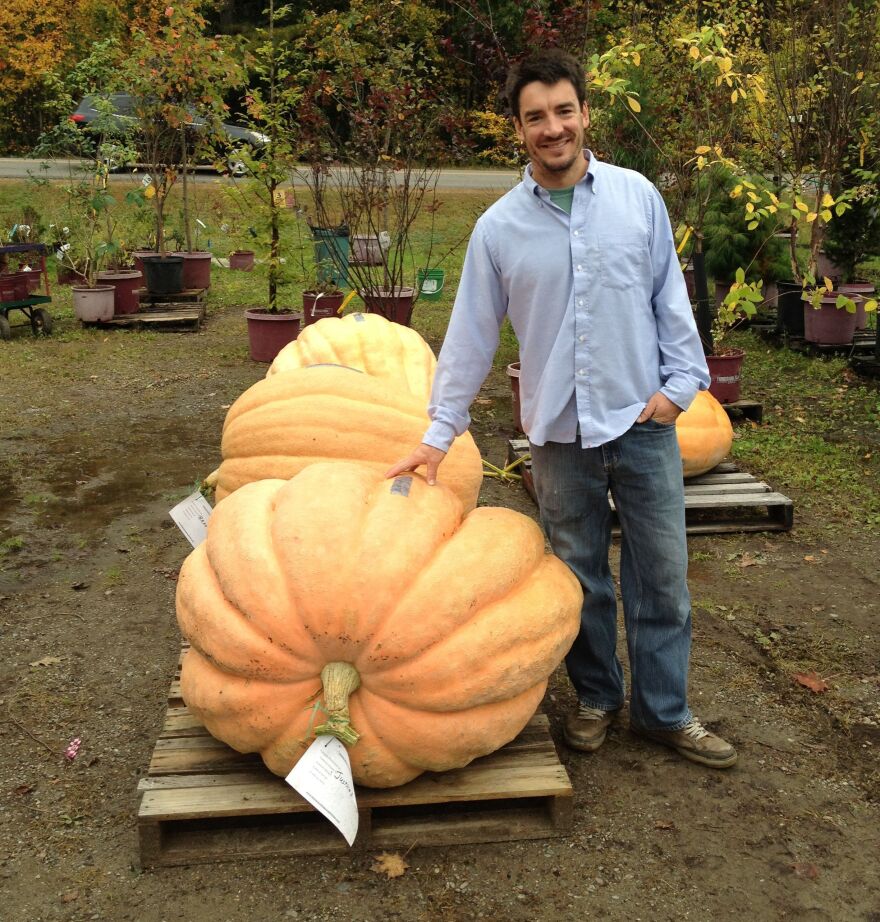The typical jack-o'-lanterns that don front stoops this time of year pale in comparison to their multihundred-pound brethren: the giant pumpkin. Every year in Damariscotta, Maine, people hollow them out, climb inside and race them in the annual pumpkin regatta. There are two divisions — paddleboat and powerboat — and thousands gather to see whether it will be sink or swim for the contestants.
Topher Mallory bolts a wooden frame onto the flesh of his 550-pound pumpkin powerboat. The stern is large enough to mount a 10 horsepower engine — double that of most competitors.
"Bigger is better," he says. "I tend not to do things halfway." A returning champion, Mallory says he needs speed to win and to keep from sinking.
"Because the minute you start moving, water inevitably comes into the pumpkin and it's just a law of diminishing returns," he says. "Before you know it, you're sinking. But you stay afloat long enough so you've got to get the boat as quickly as it can go and get your move on."
Peter Geiger is a two-time champion in the paddle division.
"It's not like you can put it in the water and see how it floats and pick it back up," he says. "These things are 5-, 6-, 700 pounds."
Geiger gets his pumpkins from a secret source that grows them to an ideal 500 pounds. He has them professionally decorated by a former airbrush artist. This year, it's a bat with foam wings extending out from the sides. He even has a two-person pit crew. It's all in the spirit of defending his title and not disappointing his fans.
"I've never been on a basketball court or a football stadium with everyone cheering for me, and here I have these thousands of people just loving what I'm doing," Geiger says.

'Awe-Inspiring' Pumpkins
A tractor places pumpkins into the water and paddlers gingerly slip from a dock into their pumpkins, hollowed out just big enough for them to kneel in. Geiger's pit crew makes some last-minute adjustments; his boat leans too far forward, so the crew shaves off extra weight in pumpkin meat.
The starter announces: "Paddlers! Ready! Set! Get wet!"
One racer tips into the water right out of the gate. Geiger and the rest paddle feverishly to a pumpkin buoy a few hundred feet away and create a bottleneck as they paddle around and race back to the dock. Geiger comes in third, behind a competing pumpkin that lists from side to side.
In the motorized division, it's Topher Mallory's turn. There's last-minute panic when his engine dies moments before the race. But a mechanic friend manages to revive it.
Mallory's boat, twice the length of the others and with a bow that helps cut through the water, cruises to an easy first place.
He plans to defend his title next year. Geiger says he can't resist the regatta, either.
"There are not so many things in life that are as simple, as fun and as awe-inspiring as giant pumpkins," he says. Next year, he's determined to reclaim his champion status.
Copyright 2020 Maine Public. To see more, visit Maine Public.


